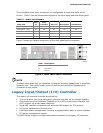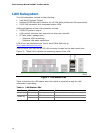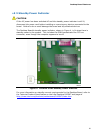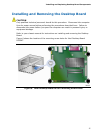
Intel Desktop Board D425KT Product Guide
20
Instantly Available PC Technology
Instantly Available PC technology enables the board to enter the ACPI S3 (Suspend-to-
RAM) sleep-state. While in the ACPI S3 sleep-state, the computer will appear to be off
(the hard drive(s) and fan will power off, the front panel power LED will blink). When
signaled by a wake-up device or event, the system quickly returns to its last known
state.
The board supports the PCI Bus Power Management Interface Specification. Add-in
boards that also support this specification can participate in power management and
can be used to wake the computer.
The use of Instantly Available PC technology requires operating system support and
PCI 2.3 compliant add-in cards and drivers.
LAN Wake Capabilities
The board’s LAN wake capabilities enable remote wake-up of the computer through a
network. The LAN subsystem network adapter monitors network traffic at the Media
Independent Interface. The board supports LAN wake capabilities with ACPI in the
following ways:
• By Ping
• By Magic Packet
Upon detecting the configured wake packet type, the LAN subsystem asserts a wake-
up signal that powers up the computer.
Wake from USB
USB bus activity wakes the computer from an ACPI S1 or S3 state.
NOTE
Wake from USB requires the use of a USB peripheral that supports wake from USB.
Wake from PS/2 Device
PS/2 keyboard activity wakes the computer from an ACPI S1, S3, S4, or S5 state.
However, when the computer is in an ACPI S4 or S5 state, the only PS/2 activity that
will wake the computer is the Alt + Print Screen key combination or the Power key
available only on some keyboards.
PME# Wakeup Support
When the PME# signal is asserted on the PCI bus, the computer wakes from an ACPI
S1, S3, S4, or S5 state.
Wake from Serial Port
Serial port activity wakes the computer from an ACPI S1 or S3 state.


















